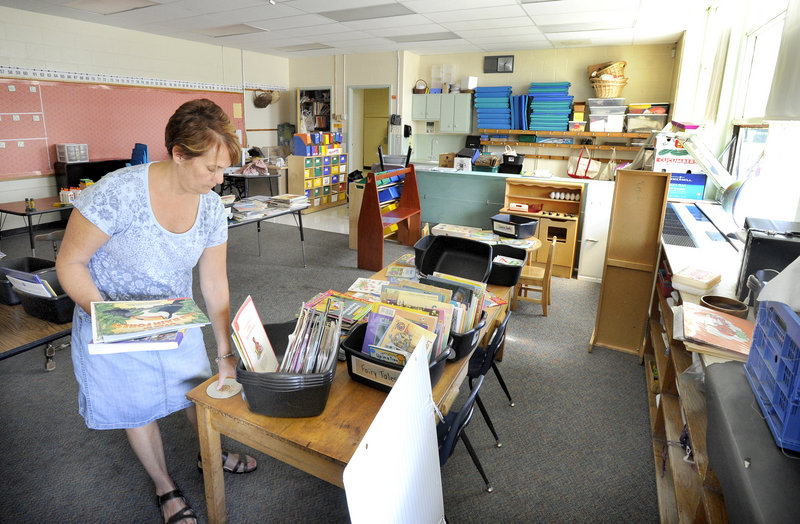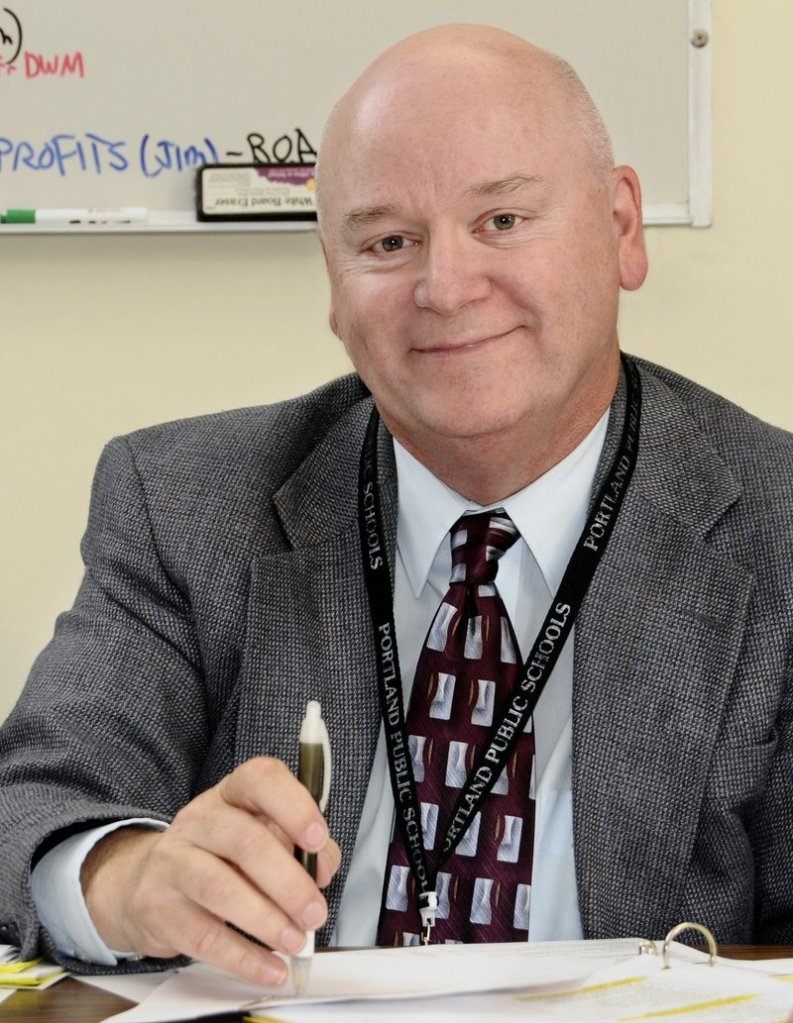PORTLAND — The link between saving money on classroom supplies and preserving teaching jobs is obvious to Suzanne Keller.
The kindergarten teacher at Presumpscot Elementary School worried through most of last year, when a $2.7 million curtailment in state funding threatened to eliminate dozens of jobs in the city’s public schools.
This year, Superintendent Jim Morse has capped principals’ discretionary spending at 60 percent of the budgeted $1.3 million, expecting to save about $500,000 in case the state curtails funding this fall.
So, when Keller had a chance this week to buy packs of crayons for 25 cents each at a discount store, she pulled out her wallet and bought a bunch, knowing that her principal would reimburse her.
“We’re saving money for the school and for the district, and hopefully saving jobs,” Keller said Tuesday as she prepared her classroom to welcome students on Sept. 9.
Principals and teachers in Portland say they will pinch every penny this year and continue to seek help from various sources in the community.
Maine education officials warned superintendents last month that a state funding curtailment is likely this year because Maine’s two-year budget faces a $100 million revenue shortfall. They didn’t say exactly how much each district could lose, and it could be months before that information is available.
Morse said he acted early because Maine’s largest school district has more to lose than smaller districts.
“If you have a sense that, financially, it’s going to be a difficult year, you don’t wait until the hammer comes down in Augusta,” he said.
The cap means that principals in the city’s 16 public schools will have about $760,000 for classroom supplies, furniture, staff development, field trips and day-to-day expenses. Before the cap, the district’s $592,000 budget for general supplies was up 35 percent this year, and the $677,000 budget for teaching supplies was up 10 percent.
Morse said he plans to enforce the cap through December, even though Congress and President Obama approved an education and Medicaid funding bill last week that’s expected to provide $77 million to the state’s general fund and $39 million for aid to prevent school layoffs.
If Portland’s $89.9 million school budget remains strong into the winter, including $16 million in state and federal funding, Morse said he may let principals spend the remaining $500,000 in discretionary funds.
He noted that the district faces a $4 million reduction in state and federal funding next year.
The School Committee hasn’t voted on Morse’s spending cap, but members support it, said Kate Snyder, finance chairwoman.
“There’s a will to get out in front of the curve,” Snyder said. “We don’t know what revenues are going to be next year and there’s no harm in starting the year conservatively.”
Snyder said committee members have learned that some principals spend all of their discretionary funds at the beginning of the school year, while others spend only what they need as they need it. The cap will encourage all principals to take a more conservative approach, she said.
At Hall Elementary School, the cap means Principal Kelly Hasson can spend about $32,000 of the $53,000 that she was allocated for discretionary expenses. Each teacher will start the year with $400 instead of $600 to spend on classroom supplies.
Many teachers had to reduce purchase orders submitted in June, but core teaching and learning materials won’t be affected, Hasson said.
“We would much rather be in this proactive state instead of having layoffs later, and teachers understand that,” Hasson said. “Everyone is being as cost-efficient as they can be.”
To fill the gap, teachers probably will seek more help from parents and other community resources, Hasson said.
The Hall Parent-Teacher Organization paid an additional $475 this year for membership in Ruth’s Reusable Resources, a nonprofit in Portland that operates a free store for teachers offering donated items, from paper and pencils to desks and chairs.
Ruth’s increased its membership fee this year from $2 to $3 per student, pushing the Hall School’s annual fee from $950 to $1,425, Hasson said. Still, it’s a valuable investment. Last year, Hall School teachers received supplies worth $75,000.
At Presumpscot Elementary School, Principal Cynthia Loring has capped her $30,000 discretionary budget at $18,000, mostly by eliminating staff development in the first half of the year.
“I appreciate having a heads-up at the start of the year,” Loring said. “We apportion our expenses throughout the year anyway, so we’ll be paying close attention to purchase orders and making sure we get only necessary items. Right now, we have what we need.”
For classroom extras, ranging from facial tissues to digital cameras, Loring said her staff reaches out to parents and other community resources.
Teachers usually send home wish lists for items such as pencils, glue sticks, hand sanitizer, bandages and healthy snacks — often because parents ask what they can contribute.
Last year, Presumpscot teachers also received $13,000 worth of classroom supplies from Ruth’s Reusable Resources and $18,000 worth of learning materials through DonorsChoose.org, a website that allows the public to support special projects in public schools.
Keller, the kindergarten teacher, received two digital cameras, a photo printer and other items through DonorsChoose and used them for a multicultural learning project.
“Our teachers are pretty resourceful,” said Jackie Adamo, a parent who heads the Presumpscot Family Council. “Some of them even spend their own money for things they want.”
Kathleen Casasa, president of the Portland teachers’ union, said she’s not sure the spending cap is the most effective way to save money.
She’d rather see a hiring freeze, especially as Morse fleshes out a reorganization of his central office staff that includes several renamed and new positions.
“That would be where I would go first,” Casasa said. “I don’t think you’re going to find much sympathy among teachers and parents with the amount of high-level hiring we’re doing.”
Morse has promised that the reorganization won’t increase administrative costs. David Galin, the new chief academic officer and a Hall School parent, said all job openings are being reviewed to ensure that only necessary positions are filled.
“We need to build a system that’s sustainable without magic money from the federal government in the future,” Galin said. “As a parent, I’m used to buying pencils and notebooks for my child. But we will make sure that our core instructional programs are supported.”
Staff Writer Kelley Bouchard can be contacted at 791-6328 or at: kbouchard@pressherald.com
Send questions/comments to the editors.



